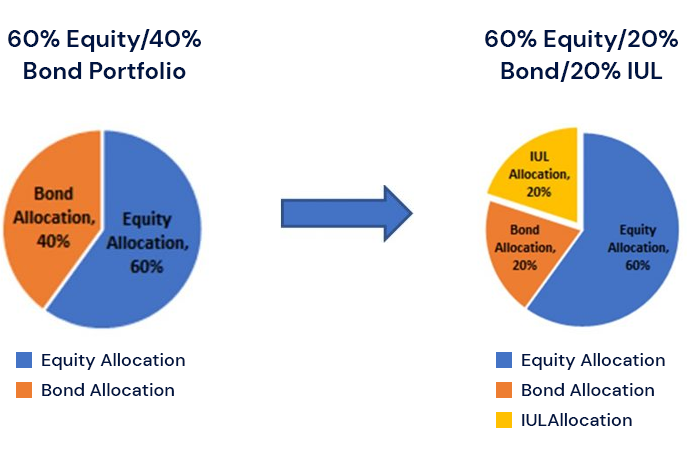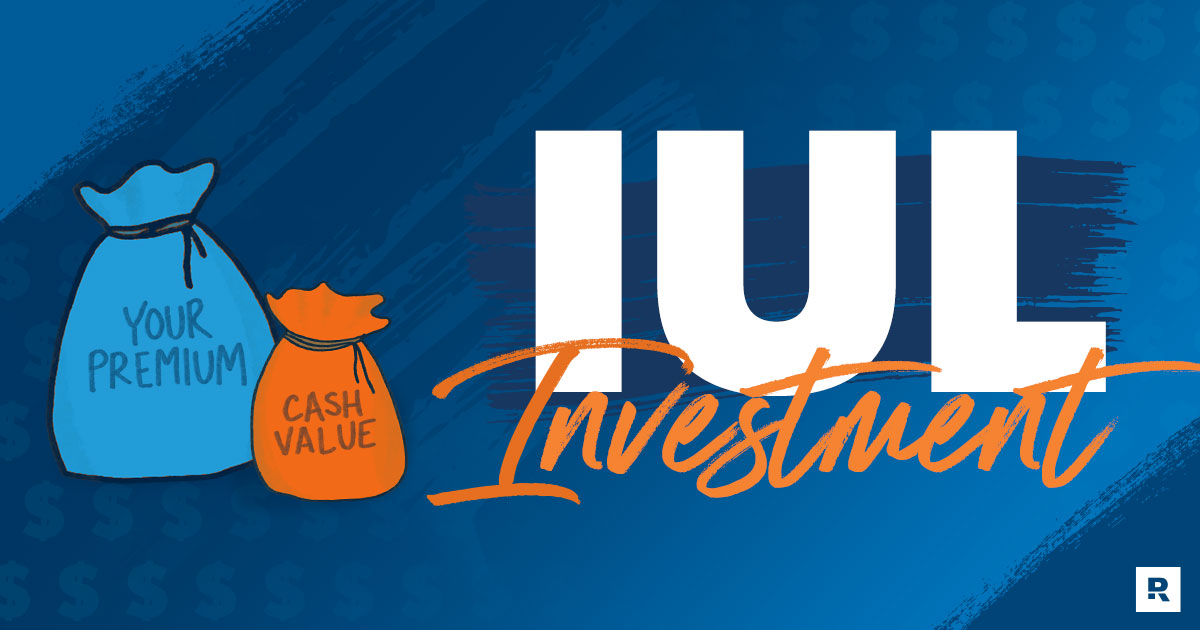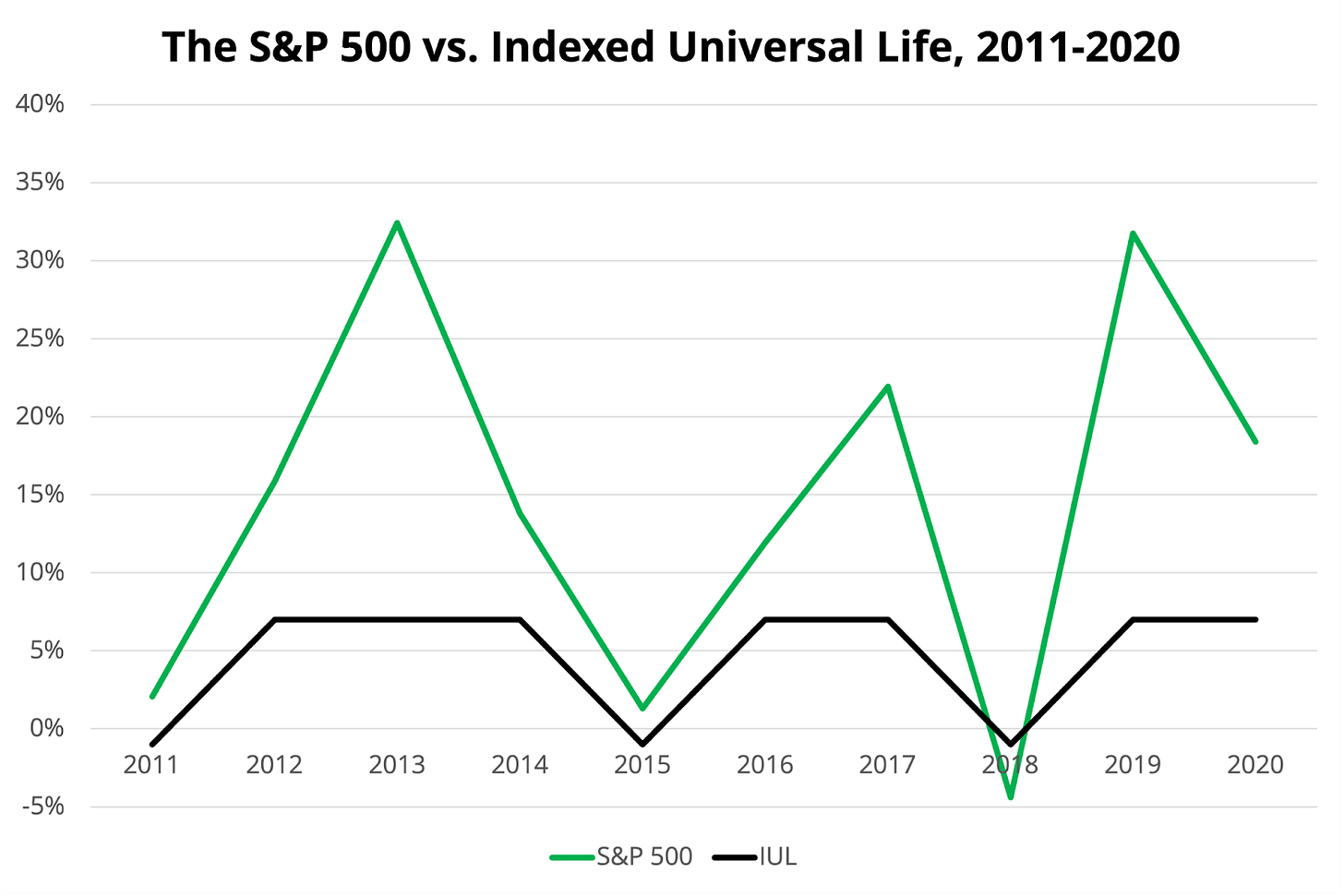All Categories
Featured
Table of Contents
For gaining a restricted amount of the index's growth, the IUL will certainly never ever get much less than 0 percent rate of interest. Even if the S&P 500 decreases 20 percent from one year to the next, your IUL will not shed any type of money worth as a result of the marketplace's losses.

Picture the rate of interest intensifying on a product with that kind of power. Offered all of this details, isn't it conceivable that indexed global life is an item that would allow Americans to acquire term and invest the rest?
A true investment is a securities item that goes through market losses. You are never subject to market losses with IUL just due to the fact that you are never based on market gains either. With IUL, you are not spent in the market, yet merely gaining interest based on the performance of the marketplace.
Returns can expand as long as you continue to make repayments or maintain a balance.
Allianz Indexed Universal Life
Unlike global life insurance policy, indexed universal life insurance policy's cash worth makes rate of interest based on the performance of indexed stock markets and bonds, such as S&P and Nasdaq. It isn't straight spent in the stock market. Mark Williams, CEO of Brokers International, points out an indexed global life plan resembles an indexed annuity that seems like universal life.

Universal life insurance policy was produced in the 1980s when passion rates were high. Like various other kinds of irreversible life insurance, this policy has a money worth.
Indexed global life policies offer a minimum surefire rates of interest, also understood as a rate of interest crediting floor, which lessens market losses. As an example, say your money value loses 8%. Lots of companies offer a floor of 0%, indicating you won't shed 8% of your financial investment in this instance (group universal life). Be conscious that your cash worth can decline even with a flooring because of costs and other costs.
Iul Retirement
A IUL is an irreversible life insurance coverage policy that borrows from the residential or commercial properties of a global life insurance coverage policy. Unlike universal life, your money worth grows based on the performance of market indexes such as the S&P 500 or Nasdaq.
Her job has actually been released in AARP, CNN Emphasized, Forbes, Lot Of Money, PolicyGenius, and U.S. Information & World Record. ExperienceAlani has actually reviewed life insurance policy and pet dog insurer and has created various explainers on traveling insurance, credit history, debt, and home insurance coverage. She is enthusiastic concerning demystifying the intricacies of insurance coverage and other personal financing subjects to ensure that visitors have the info they require to make the very best cash decisions.

Paying only the Age 90 No-Lapse Premiums will assure the fatality benefit to the insured's achieved age 90 yet will certainly not ensure cash worth accumulation. If your customer stops paying the no-lapse guarantee premiums, the no-lapse feature will certainly end prior to the guaranteed duration. If this takes place, additional costs in a quantity equal to the shortfall can be paid to bring the no-lapse feature back effective.
I recently had a life insurance policy salesperson appear in the comments thread of an article I released years ago about not mixing insurance coverage and investing. He believed Indexed Universal Life Insurance Coverage (IUL) was the very best point since sliced bread. In assistance of his placement, he posted a link to a write-up written in 2012 by Insurance Coverage Agent Allen Koreis in 2012, entitled "16 Reasons Why Accountants Prefer Indexed Universal Life Insurance Coverage" [link no more readily available]
Iul Insurance Calculator
Initially a short explanation of Indexed Universal Life Insurance. The attraction of IUL is apparent. The premise is that you (virtually) obtain the returns of the equity market, with no risk of shedding cash. Currently, prior to you fall off your chair poking fun at the absurdity of that statement, you require to recognize they make a really convincing debate, at the very least till you check out the information and realize you don't obtain anywhere near the returns of the equity market, and you're paying much too much for the warranties you're getting.

If the market drops, you obtain the ensured return, typically something in between 0 and 3%. Obviously, since it's an insurance coverage plan, there are likewise the common costs of insurance coverage, commissions, and abandonment charges to pay. The information, and the reasons that returns are so horrible when blending insurance coverage and investing in this specific way, boil down to primarily three points: They just pay you for the return of the index, and not the dividends.
Universal Guaranteed Life Insurance
If you cap is 10%, and the return of the S&P 500 index fund is 30% (like last year), you get 10%, not 30%. If the Index Fund goes up 12%, and 2% of that is returns, the modification in the index is 10%.
Include all these impacts together, and you'll find that long-term returns on index global life are quite darn close to those for whole life insurance policy, positive, however reduced. Yes, these policies guarantee that the cash worth (not the cash that goes to the expenses of insurance policy, obviously) will certainly not lose money, however there is no assurance it will certainly stay on top of rising cost of living, a lot less grow at the price you need it to grow at in order to offer your retirement.
Koreis's 16 reasons: An indexed global life policy account worth can never lose cash due to a down market. Indexed universal life insurance policy guarantees your account value, locking in gains from each year, called a yearly reset.
IUL account values grow tax-deferred like a certified plan (Individual retirement account and 401(k)); mutual funds do not unless they are held within a qualified strategy. Merely placed, this implies that your account value benefits from three-way compounding: You earn passion on your principal, you earn interest on your passion and you earn passion on the cash you would otherwise have actually paid in taxes on the passion.
Life Insurance Flexible
Although qualified plans are a far better choice than non-qualified plans, they still have problems absent with an IUL. Investment choices are generally limited to shared funds where your account value is subjected to wild volatility from exposure to market risk. There is a big distinction between a tax-deferred pension and an IUL, yet Mr.
You buy one with pre-tax bucks, saving money on this year's tax costs at your minimal tax obligation price (and will certainly often have the ability to withdraw your money at a reduced effective rate later on) while you purchase the other with after-tax dollars and will be compelled to pay passion to borrow your own cash if you don't wish to surrender the plan.
Then he tosses in the classic IUL sales person scare tactic of "wild volatility." If you hate volatility, there are far better methods to lower it than by purchasing an IUL, like diversification, bonds or low-beta supplies. There are no restrictions on the amount that might be contributed yearly to an IUL.

That's reassuring. Allow's think of this momentarily. Why would the federal government put limitations on just how much you can place into retirement accounts? Perhaps, just perhaps, it's since they're such a good deal that the federal government does not desire you to conserve excessive on tax obligations. Nah, that could not be it.
Table of Contents
Latest Posts
Universal Life Calculator
Iul As A Retirement Vehicle
Iul 7702
More
Latest Posts
Universal Life Calculator
Iul As A Retirement Vehicle
Iul 7702